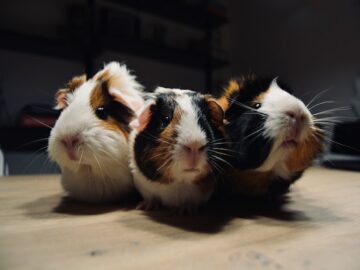If you’ve never had a pet before and want to start taking care of one now, you might want to try on the Guinea pig first. Guinea pigs are excellent pets for beginners, although not necessarily for young kids because they require a bit of maintenance for good health and hygiene.
However, if you are up to the task, you’ll enjoy having them as your first pets. Just know these ten essential facts about them before you start.
They are not pigs
Guinea pigs are not pigs, so don’t treat them like one. They are rodents. Their misleading name might have come from the fact that during the 16th century, they were sold in England for a guinea (currency) each, and people often refer to them as “little pigs” because of the tiny squeaks they make.
Courtesy of Pixabay
They need other Guinea pigs for companionship
Guinea pigs are very social creatures. They live in groups of several members in the wild, so they are not used to solitary living. If you want to care for Guinea pigs, consider getting a pair at least. It doesn’t matter if they are both males, females, or a mix. The important thing is that they have company.
You can also befriend them to make them more relaxed around you or other humans. This might help, but you must substitute for another Guinea pig.
They leave plenty of scent marks
Guinea pigs like marking stuff. They leave plenty of scent marks by rubbing their chin or cheeks across things. They do this for their surroundings to smell and feel more familiar and reassuring.
This is a crucial detail to remember because when you clean their cages and replace their bedding, you shouldn’t throw everything away. You need to return some of the old bedding to the cage to keep your Guinea pigs relaxed.
They are awake most of the time
Unlike dogs or cats who like taking plenty of naps, Guinea pigs are almost always active. They spend nearly 20 hours (out of the 24 in a day) moving about.
Because of this, you must provide adequate food, water, toys, and several hiding places to keep them engaged. Otherwise, they could wind up getting bored and then start picking on each other.
Courtesy of vantagepointfl
They need regular mental stimulation
With 20 hours of waking time, Guinea pigs constantly need mental stimulation. So, before you get one, consider the different materials and activities you can include in your pet’s cage—wheels, tunnels, balls, and other toys.
You may also want to gently but regularly engage your pet by touching it (though you have to be careful and patient). This can be part of your pet’s daily routine so they get used to being around humans.
They can jump
If you plan on keeping the walls of their cages low or you’re planning on putting up a platform in their cage, then think again. Guinea pigs look cute and docile but don’t underestimate these little critters.
When they get excited, these fuzzy furballs can jump up and even turn 90 degrees in mid-air in a move people call “pop-corning”. With a platform to jump from, they might just end up somersaulting their way to freedom.
They require vitamin supplements
Just like us, Guinea pigs are not able to synthesize or store Vitamin C very well. This is why you should always be conscious of what you feed them. If they don’t get regular vitamins in their diet, you have to ensure they get vitamin supplements instead.
Without vitamin C, they become weak and lethargic, lose weight, get a bad coat, or even have internal bleeding.
Courtesy of mits hak
They need plenty of feeding hay
You should always include a lot of good-quality feeding hay in your Guinea pig’s diet. Hay not only provides them with excellent materials to keep their guts healthy, but it also helps keep their constantly-growing teeth at just the right size.
If you can’t get the hay in your area, then you can consider buying gnaw sticks for your little furry little gnashers.
They can live long lives
If you get Guinea pigs, you’re dedicating around 7-10 years of care for them because they live long lives. If kept in ideal conditions—with the proper nutrition, suitable accommodation, company, and receiving regular attention and stimulation, these cute rodents often live for 7 to 10 years.
One specific Guinea pig, Snowball, holds the record for the oldest Guinea pig in the world. He almost made it to 15 years.
They don’t get along with rabbits
Guinea pigs are sociable creatures, but for some reason, they don’t get along well with rabbits. These little rodents get bullied or picked on when put together with rabbits.
They also die much younger, proving they are happiest when the rabbits are around. So, if you’re getting Guinea pigs, say goodbye to owning rabbits or putting them in the same area.
For Your Child’s Guinea Pig Fascination
Thinking of getting a guinea pig for your children? Being a pet owner is a huge responsibility, so we’ve curated a list of items you can purchase from Petco in preparation:
- Hay, for their little munchies
- A small cage to keep them safe
- Quality bedding for their comfort
Frequently Asked Questions about Guinea Pigs
Do Guinea pigs like to be cuddled?
If you’re expecting the kind that dogs and cats give you, then no. They won’t run up to you for a cuddle, at least not initially. Guinea pigs have serious trust issues, after all. This is because they are prey materials to most bigger animals.
However, when encouraged the right way, and given enough time, they will eventually come to you for a scratch or a gentle massage. On some occasions, they might even sleep on your lap.
Are Guinea pigs smart?
Yes, they are. Guinea pigs learn to respond to names, can do tricks, and even display a certain level of problem-solving skills and empathy. They learn stuff and can be taught to do certain things, although training takes time.
Do Guinea pigs bite?
Being docile creatures, they usually don’t. However, when they are near you and they are trying to get your attention, they can “mouth” you, which is like a gentle bite. It doesn’t hurt, but it may surprise you if you are unaware they can. These are not aggression bites.
They can, however, show aggressiveness toward other Guinea pigs and may even fight. During these confrontations, they bite forcefully and aggressively, often resulting in bloody conclusions.







